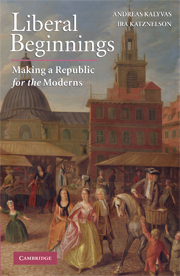Crossref Citations
This Book has been
cited by the following publications. This list is generated based on data provided by Crossref.
Kimpell, Jessica L.
2009.
Neo-republicanism: Machiavelli’s solutions for Tocqueville’s republic.
European Political Science Review,
Vol. 1,
Issue. 3,
p.
375.
WRIGHT, JOHNSON KENT
2009.
THE HARD BIRTH OF FRENCH LIBERALISM.
Modern Intellectual History,
Vol. 6,
Issue. 3,
p.
597.
Williams, Michael C
2010.
International Political Theory after Hobbes.
p.
147.
Bradburn, Douglas
2010.
The Problem of Citizenship in the American Revolution.
History Compass,
Vol. 8,
Issue. 9,
p.
1093.
Garsten, Bryan
2010.
Religion and the Case Against Ancient Liberty: Benjamin Constant’s Other Lectures.
Political Theory,
Vol. 38,
Issue. 1,
p.
4.
Spitz, Jean-Fabien
2010.
Originalité et pertinence contemporaine du langage politique républicain. Une approche historiographique et analytique.
Raisons politiques,
Vol. n° 36,
Issue. 4,
p.
131.
Jourdan, Annie
2011.
The Netherlands in the constellation of the eighteenth-century Western revolutions.
European Review of History: Revue europeenne d'histoire,
Vol. 18,
Issue. 2,
p.
199.
Nehring, Holger
2011.
‘Civility’ in history: some observations on the history of the concept.
European Review of History: Revue europeenne d'histoire,
Vol. 18,
Issue. 3,
p.
313.
2011.
American Politicians Confront the Court.
p.
71.
Williams, Michael C.
2011.
Securitization and the liberalism of fear.
Security Dialogue,
Vol. 42,
Issue. 4-5,
p.
453.
Camus, Anaïs
and
Storme, Tristan
2011.
Carl Schmitt, lecteur de Tocqueville.
Revue européenne des sciences sociales,
p.
7.
Turner, Brandon P.
2012.
Adam Ferguson on “Action” and the Possibility of Non-Political Participation.
Polity,
Vol. 44,
Issue. 2,
p.
212.
URBINATI, NADIA
2012.
Competing for Liberty: The Republican Critique of Democracy.
American Political Science Review,
Vol. 106,
Issue. 3,
p.
607.
2012.
Poverty in Common.
p.
257.
2012.
Poverty in Common.
p.
1.
Douglass, Robin
2012.
Montesquieu and Modern Republicanism.
Political Studies,
Vol. 60,
Issue. 3,
p.
703.
2012.
Poverty in Common.
p.
111.
2012.
Poverty in Common.
p.
77.
de Dijn, Annelien
2012.
Pluralism and the Idea of the Republic in France.
p.
66.
2012.
Poverty in Common.
p.
323.





